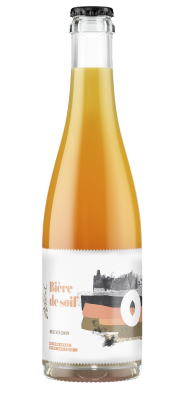Malts:
Malt base is very important for all long-aged beers and in this particular case it consists of the multigrain local and continental base malts.
Hops:
Addition of hops is “homeopathic”, necessary from the technological point of view, because thanks to it we can clarify the wort. Bitterness is therefore trace and virtually imperceptible. Hops are the enemy of many non-yeast microorganisms, they would interfere with unhampered fermentation. Beers of this type are the least hopped beers in the world – we used one of our all-time favourites, german Tettnanger variety.
Fermentation:
Real magic takes place during fermentation. Each time it is unique.
Bière de soif was fermented in stages:
Primary fermentation: in steel with a clean Saccharomyces cerevisiae strain
Second fermentation: in oak with a melange of our house Brettanomyces and Lactobacilus strains.
Refermentation with fruits: Mixed with local apricots for 4 weeks and refermented and conditioned in bottles for over a month.
Fruits:
We only work with the best quality and as local as possible fruits in our Bière de soif series. These beers are a true agricultural products celebrating locality and temporality.
Changes over time:
Time is extremely important for these kind of beers, because the microorganisms that take part in their production ferment slowly. That is why we leave them in barrels for several months so that they take on their extraordinary character.
This beer remains alive – it is not pasteurized, but refermented in a bottle. This means that even after filling, microbes ferment – saturating, protecting and changing beer character all the time.
We recommend drinking this beers fresh, but stored in the right conditions (cool and dark) they can be consumed in 5 years from the bottling date. Note that this beer is probably going to be different consumed fresh or aged – it develop and constantly changes with the time!
Transparent bottles:
We poured Biere de soif into transparent “Champenoise” thick glass bottles with a capacity of 375 ml, which are used in the production of champagne. This choice was not accidental – bottles of this type best match the Bierre De Soif style, emphasizing their champagne character! Under normal conditions, beers should not be stored in transparent or green glass packaging, cause they let in too much UV light, which damages hop compounds. This beer, however, is hopped to a minimal extent, and the addition of fruits must naturally protect it from the effects of UV light. Thanks to this fact, we can enjoy beautiful color visible from a distance, as well as the natural opalescent effect created, among others, by bacteria and yeast that were used during fermentation.
Serving tips:
Beers of this type are highly saturated, therefore they should be served in the right way:
1. Serve well chilled
Like sparkling wines and champagne, our Biere de soif beers taste best when cooled properly before opening – we recommend storing them vertically at 4 to 6 degrees for about 24 hours before opening!
2. Be careful
The pressure inside the bottle caused by refermantation is definitely higher than in beers not subjected to this process and can be comparable to champagne – so be careful when opening!
3. Hold and pour at an angle
Holding the bottle at an angle when opening increases the surface of the liquid in the neck of the bottle, thanks to which the pressure releases more freely minimizing foaming. Transfer to glass should also be at an angle to reduce the loss of dissolved carbon dioxide and prevent excessive foaming. Beer should be poured without any natural yeast precipitate that can accumulate at the bottom of the bottle.
- Style: Bière de soif refermented with Apricots
- Parameters:
- Extract: 15,0 %
- Alcohol: 8,5 %
- IBU: 5
- Ingredients: Malt, Hops, Yeast, Water, Apricots.
- Malts: barley: Pils, wheat
- Hops: aromatic: Tettnanger (DE)
- Yeasts:
- Primery fermentation: saccharomyces cerevisiae (british strain);
- Barrel fermentation: house Brettanomyces and Lactobacilus strains;
- Additives: freshly picked, local apricots
- Appearance: light orange color, hazy with a thick white foam.
- Aromas: Fresh, good balance between the apricots sweetness and funky beer base.Rustic and herbal.
- Mouthfeel:
- Medium up to full-bodied, yet dry. High carbonated.
- Serving temperature: 5-7⁰C
- Glass: Tulip, Snifter, Stange or Flute (choose which ones you like best – Tulip and Snifter will intensify the aromatic sensations, while stange or flute will reduce them a bit)
- Foodpairing:
- Dishes: Deer sirloin steak with apricot sauce / grilled halloumi cheese with peach and coriander salsa
- Cheese: manchego cheese, matured cheddar
- Dessert: vanilla panna cotta, rustic pie with peaches and crumble



